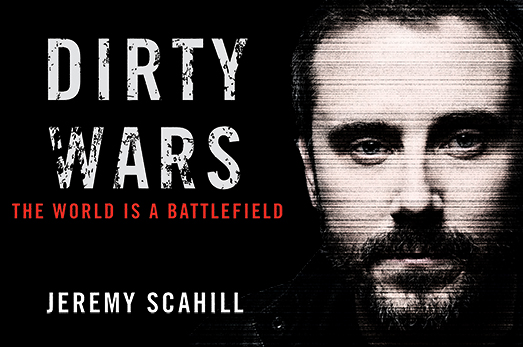
“Dirty Wars,” Jeremy Scahill's exposé on the U.S. government's tactics for fighting terrorism since September 11, 2001, is Steve Weinberg's pick for best investigative journalism book of 2013. Author photo by Jeff Vespa/WireImage
Contrary to the conventional wisdom, investigative reporting is plentiful within American journalism. That is especially true in the realm of books, despite the much decried conglomeratization of publishers.
Following the economic meltdown of 2008, a pile of financial whodunits was published examining various aspects of the collapse. There’s no such readily identifiable trend this year so let me simply present my list of the top 10 investigative journalism books of 2013.
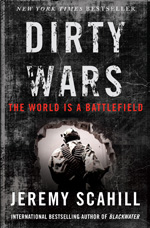 Arguably (I use that word consciously) the best of the best is “Dirty Wars: The World Is a Battlefield,” by Jeremy Scahill (Nation Books). In the aftermath of what happened on September 11, 2001, lots of books by American journalists have appeared about the failures of U.S. intelligence agencies and law enforcement agencies coupled with narratives about questionable government policies—sometimes misguided, sometimes illegal—to strike back against enemies seen and unforeseen. Of the few dozen I have read, Scahill’s stands out for its scope, firm documentation, and brisk writing.
Arguably (I use that word consciously) the best of the best is “Dirty Wars: The World Is a Battlefield,” by Jeremy Scahill (Nation Books). In the aftermath of what happened on September 11, 2001, lots of books by American journalists have appeared about the failures of U.S. intelligence agencies and law enforcement agencies coupled with narratives about questionable government policies—sometimes misguided, sometimes illegal—to strike back against enemies seen and unforeseen. Of the few dozen I have read, Scahill’s stands out for its scope, firm documentation, and brisk writing.I knew little about Scahill until publication of his previous book, “Blackwater: The Rise of the World’s Most Powerful Mercenary Army.” That book impressed me so much six years ago I began seeking out Scahill’s reporting for The Nation magazine, his conversations on the radio show “Democracy Now!” and his freelancing for other outlets.
Scahill opens his book by telling readers “This is a story about how the United States came to embrace assassination as a central part of its national security policy. It is also a story about the consequences of that decision for people in scores of countries across the globe and for the future of American democracy.” In addition, Scahill promises to exposé the expansion of presidential privilege, the unencumbered use of unaccountable elite military units, and the growth of state secrets that should be available to all voters. He delivers on each promise.
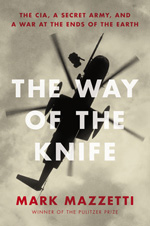 New York Times reporter Mark Mazzetti’s book “The Way of the Knife: The CIA, a Secret Army, and a War at the Ends of the Earth” (Penguin Press) covers some of the same matter as Scahill’s book, though it is less sweeping. None of that is meant as faint praise. Mazzetti unearths compelling details about new methods of U.S. warfare in Somalia, Yemen and Pakistan, among other locales. After reading Mazzetti’s exposé and/or Scahill’s exposé, it seems impossible to conclude that President George W. Bush and President Barack Obama have acted wisely as commanders in chief of the U.S. military. Besides the legal and ethical questions their assassination policies raise, it seems unarguable that those policies are sowing additional anti-American terrorists around the globe, rather than reducing the number.
New York Times reporter Mark Mazzetti’s book “The Way of the Knife: The CIA, a Secret Army, and a War at the Ends of the Earth” (Penguin Press) covers some of the same matter as Scahill’s book, though it is less sweeping. None of that is meant as faint praise. Mazzetti unearths compelling details about new methods of U.S. warfare in Somalia, Yemen and Pakistan, among other locales. After reading Mazzetti’s exposé and/or Scahill’s exposé, it seems impossible to conclude that President George W. Bush and President Barack Obama have acted wisely as commanders in chief of the U.S. military. Besides the legal and ethical questions their assassination policies raise, it seems unarguable that those policies are sowing additional anti-American terrorists around the globe, rather than reducing the number.The remainder of my top 10, alphabetical by author:
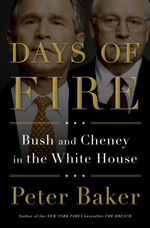 “Days of Fire: Bush and Cheney in the White House,” Peter Baker (Doubleday). Journalism is often referred to as the “first rough draft of history.” New York Times reporter Baker moves beyond the rough draft with a scrupulously reported account of decision making at the highest level during an eight-year span. Along the way, Baker explodes some of the conventional wisdom about the balance of influence between President George W. Bush and Vice President Dick Cheney.
“Days of Fire: Bush and Cheney in the White House,” Peter Baker (Doubleday). Journalism is often referred to as the “first rough draft of history.” New York Times reporter Baker moves beyond the rough draft with a scrupulously reported account of decision making at the highest level during an eight-year span. Along the way, Baker explodes some of the conventional wisdom about the balance of influence between President George W. Bush and Vice President Dick Cheney.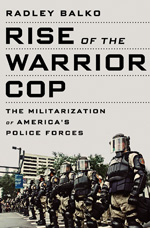 “Rise of the Warrior Cop: The Militarization of America’s Police Forces,” Radley Balko (Public Affairs). Balko began exposing law enforcement misconduct, often resulting in the imprisonment of innocent men and women, while reporting for Reason, the Libertarian magazine. He has since moved to The Huffington Post and just announced he will be joining The Washington Post staff in early 2014. Balko’s book pulls together findings from his numerous magazine exposés. He focuses on police department special weapons and tactics units, more commonly known as SWAT teams. Members of those teams regularly unleash violence against suspects for no apparent law enforcement reason, wrecking homes and commercial buildings while incurring distrust, especially in minority communities.
“Rise of the Warrior Cop: The Militarization of America’s Police Forces,” Radley Balko (Public Affairs). Balko began exposing law enforcement misconduct, often resulting in the imprisonment of innocent men and women, while reporting for Reason, the Libertarian magazine. He has since moved to The Huffington Post and just announced he will be joining The Washington Post staff in early 2014. Balko’s book pulls together findings from his numerous magazine exposés. He focuses on police department special weapons and tactics units, more commonly known as SWAT teams. Members of those teams regularly unleash violence against suspects for no apparent law enforcement reason, wrecking homes and commercial buildings while incurring distrust, especially in minority communities.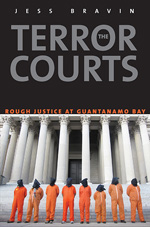 “The Terror Courts: Rough Justice at Guantanamo Bay,” Jess Bravin (Yale University Press). The Supreme Court reporter for The Wall Street Journal chronicles the illegalities and overall unwise decision making by U.S. military and civilian leaders regarding detention of alleged terrorists at the infamous prison camp adjacent to Cuba. Bravin humanizes the ugly years of Guantanamo operations by focusing on individual military and civilian lawyers wrestling with their consciences.
“The Terror Courts: Rough Justice at Guantanamo Bay,” Jess Bravin (Yale University Press). The Supreme Court reporter for The Wall Street Journal chronicles the illegalities and overall unwise decision making by U.S. military and civilian leaders regarding detention of alleged terrorists at the infamous prison camp adjacent to Cuba. Bravin humanizes the ugly years of Guantanamo operations by focusing on individual military and civilian lawyers wrestling with their consciences.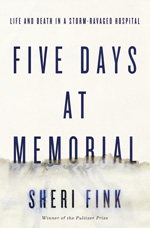 “Five Days at Memorial: Life and Death in a Storm-Ravaged Hospital,” Sheri Fink (Crown). Hurricane Katrina spawned all sorts of once-in-a-lifetime dramas around New Orleans. But the drama inside a New Orleans hospital transcends the transient fallout from a natural disaster to illuminate matters of life and death when desperation becomes the norm. Fink’s narrative revolves around whether certain medical personnel were acting heroically or with homicidal intent.
“Five Days at Memorial: Life and Death in a Storm-Ravaged Hospital,” Sheri Fink (Crown). Hurricane Katrina spawned all sorts of once-in-a-lifetime dramas around New Orleans. But the drama inside a New Orleans hospital transcends the transient fallout from a natural disaster to illuminate matters of life and death when desperation becomes the norm. Fink’s narrative revolves around whether certain medical personnel were acting heroically or with homicidal intent.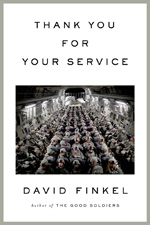 “Thank You for Your Service,” David Finkel (Farrar, Straus and Giroux). Four years ago, Finkel published “The Good Soldiers,” one of the most eloquently written, well-researched books extant about U.S. military men and women on battlefields in nations where “winning” is never an option. In his new book, Finkel narrates the return home of those soldiers as they and their loved ones try to cope with brain injuries and post-traumatic stress disorders. Unsurprisingly perhaps, the civilian and military leaders so gung-ho about sending men and women to the battlefield are often unsupportive of those who arrive home broken, so broken that suicide and domestic homicide are constant dangers and frequent reality.
“Thank You for Your Service,” David Finkel (Farrar, Straus and Giroux). Four years ago, Finkel published “The Good Soldiers,” one of the most eloquently written, well-researched books extant about U.S. military men and women on battlefields in nations where “winning” is never an option. In his new book, Finkel narrates the return home of those soldiers as they and their loved ones try to cope with brain injuries and post-traumatic stress disorders. Unsurprisingly perhaps, the civilian and military leaders so gung-ho about sending men and women to the battlefield are often unsupportive of those who arrive home broken, so broken that suicide and domestic homicide are constant dangers and frequent reality.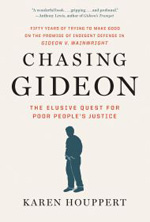 “Chasing Gideon: The Elusive Quest for Poor People’s Justice,” Karen Houppert (New Press). This book seemingly documents what “everybody knows”—that representation of indigent suspects often falls to inexperienced and/or overworked public defenders. Freelance magazine writer Houppert, however, carries her reporting into realms that not everybody understands. For example, she explains the gigantic disadvantage to defendants who have pleaded guilty to a crime, often on the lousy advice of an ill-prepared court-appointed lawyer. When the incarcerated defendant realizes he wants to appeal, a qualified lawyer is rarely available in a timely manner. Houppert's investigation makes clear that overworked, uncaring judges who are content to appoint the nearest warm body with a law degree to represent an indigent defendant are failing to uphold the mandate for effective assistance of counsel.
“Chasing Gideon: The Elusive Quest for Poor People’s Justice,” Karen Houppert (New Press). This book seemingly documents what “everybody knows”—that representation of indigent suspects often falls to inexperienced and/or overworked public defenders. Freelance magazine writer Houppert, however, carries her reporting into realms that not everybody understands. For example, she explains the gigantic disadvantage to defendants who have pleaded guilty to a crime, often on the lousy advice of an ill-prepared court-appointed lawyer. When the incarcerated defendant realizes he wants to appeal, a qualified lawyer is rarely available in a timely manner. Houppert's investigation makes clear that overworked, uncaring judges who are content to appoint the nearest warm body with a law degree to represent an indigent defendant are failing to uphold the mandate for effective assistance of counsel. “Seymour Hersh: Scoop Artist,” Robert Miraldi (Potomac Books/University of Nebraska Press). Does a biography belong on a list of investigative books? If the subject is Seymour Hersh, yes. He has defined high-risk digging on important, controversial subjects since the mid-1960s. Miraldi, a journalism professor who previously wrote a biography of muckraker Charles Edward Russell, has captured Hersh’s unusual personality, his mad-dog pursuit of evidence, and his masterful information-gathering techniques.
“Seymour Hersh: Scoop Artist,” Robert Miraldi (Potomac Books/University of Nebraska Press). Does a biography belong on a list of investigative books? If the subject is Seymour Hersh, yes. He has defined high-risk digging on important, controversial subjects since the mid-1960s. Miraldi, a journalism professor who previously wrote a biography of muckraker Charles Edward Russell, has captured Hersh’s unusual personality, his mad-dog pursuit of evidence, and his masterful information-gathering techniques. “The Everything Store: Jeff Bezos and the Age of Amazon,” Brad Stone (Little, Brown). Investigative reporting about the private sector tends to receive short shrift compared to investigative reporting about government. There has never been an investigative biography of Bezos or the company that he runs like a kingdom. Bloomberg Businessweek journalist Stone has broken new ground, demonstrating the massive influence Amazon exercises not only in the retail sector, but also throughout society, including government regulation or the lack of it.
“The Everything Store: Jeff Bezos and the Age of Amazon,” Brad Stone (Little, Brown). Investigative reporting about the private sector tends to receive short shrift compared to investigative reporting about government. There has never been an investigative biography of Bezos or the company that he runs like a kingdom. Bloomberg Businessweek journalist Stone has broken new ground, demonstrating the massive influence Amazon exercises not only in the retail sector, but also throughout society, including government regulation or the lack of it.Because of my own reporting concentration—the broken American criminal (in)justice system and especially wrongful convictions—I am more aware of books from that realm than any other. Exposés of wrongful convictions abound in book form. Most are about isolated individual cases from jurisdictions across the United States. A smaller number expose systemic trouble. I believe those books cumulatively have made a positive impact on state legislators, federal legislators, law enforcement leaders, governors, trial judges and appellate judges.
That is encouraging, of course. When investigative books lead to sincere reform, compiling the annual list feels especially worthwhile.
Steve Weinberg, former executive director of Investigative Reporters and Editors, is the author of eight nonfiction books. He is currently researching two books under contract—one about contemporary investigative journalism, the other a biography of Garry Trudeau.


